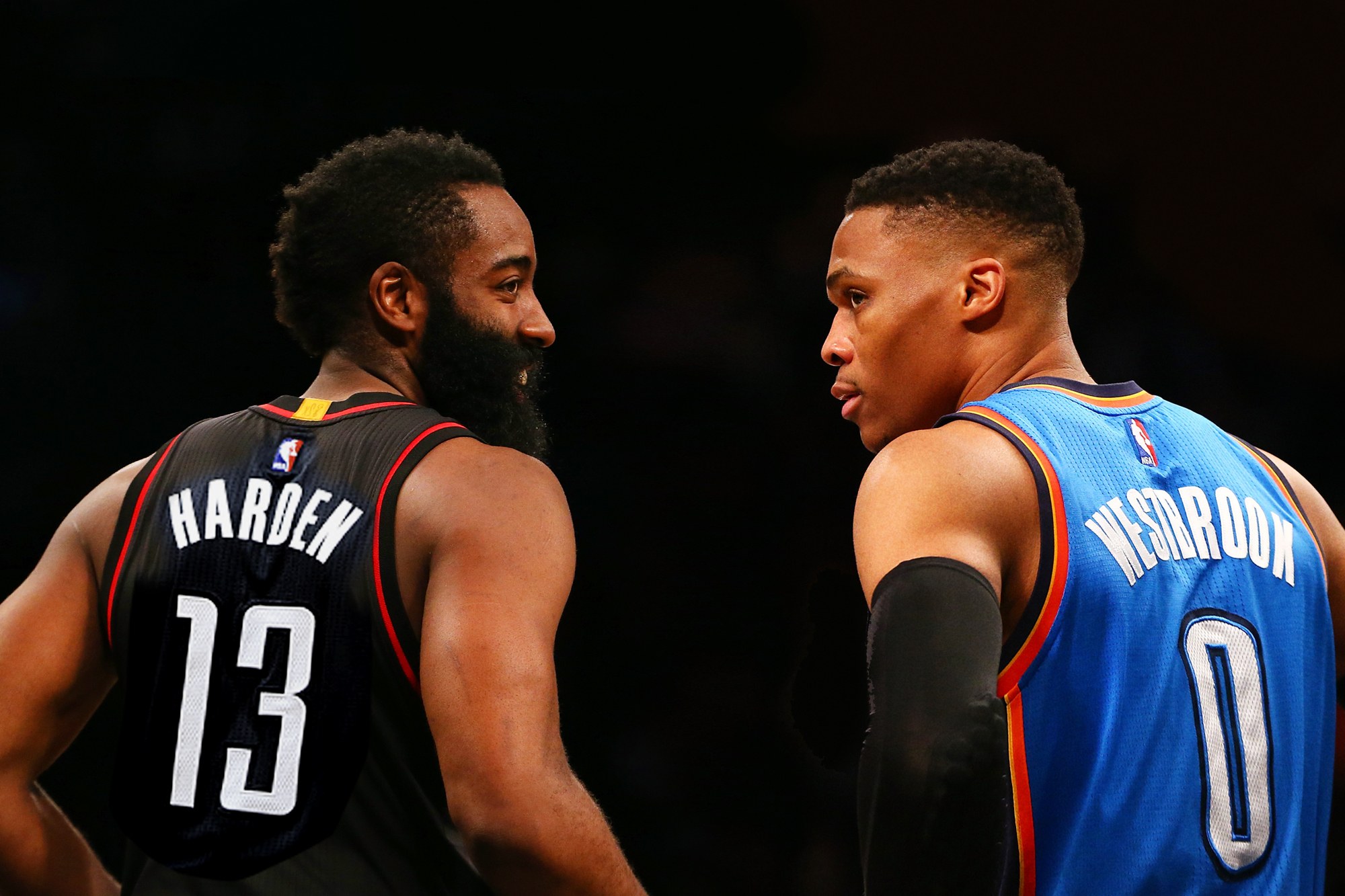Russell Westbrook vs. James Harden’s MVP debate embodies the reductive qualatative vs quantitative debate surrounding the NBA. Can the advanced metrics which help determine our perception of top players really capture the essence of their value? Does it measure the qualitative size of a player’s heart? Or the uplifting and calming presence a leader brings to a team during the course of a rocky 82-game campaign?
For the entirety of his NBA career, Westbrook has been the NBA’s Marlboro Man. The Marlboro Man on cigarette packages harkens back to a time before surgeon generals were warning about the long-term health risks of its product.
Smoking indoors is typically forbidden within NBA arenas, unless Westbrook is lighting up offensive scoreboards. His furious pace has been a dopamine boost to the cere-ball-um of Oklahoma City’s Thunder faithful for almost a decade.
However, in past seasons, as the heat turned up in fourth quarters and the temperature progressively increased as the season wore on, he tended to burn out. Too often, his visceral decision-making left Oklahoma City’s offense in ashes. Eventually, his toxicity contributed to Kevin Durant quitting his cigarette of a point guard.
Westbrook is an emotionally charged guard who can’t be reigned in by analytics. A few years ago, I argued that he needed a nicotine patch in the form of a structured system to reach his peak. Instead, Oklahoma City stepped into a puddle of gasoline, ignited a match underneath Westbrook and chainsmoked him to 47 wins.
One of the most controversial MVP outcomes in recent memory resulted in Steve Nash winning his second MVP award over Kobe Bryant. Kobe’s astronomically high usage rate that season was an NBA record which would remain unbroken until Westbrook came along.
Nash’s Suns were coached by a mustachioed Pringles-American offensive visionary named Mike D’Antoni who sought to change the paradigm. Nash and the Suns were an early warning forecast for Harden’s Rockets.
Charles Barkley is the mouthpiece for a generation of retirees who shake their canes at this generation and their conflabbin computer algorithms. Two years ago, he painted a target on the back of the Rockets architect, Daryl Morey, his reliance on analytics and juiced up offenses.
It coincided with a story by Chris Broussard which suggested that old school basketball minds were worried they were being pushed out by quantitative “stat guys.” To many in the NBA’s sphere of influence, this MVP race was a battle for the soul. Will the NBA be ruled by old jocks or new age nerds?
Westbrook is as much of a late 90s, early 2000s throwback figure in the NBA as James Harden is representative of the vanguard. Under the illuminating lights of modern analytics, Westbrook’s season pales in comparison to Harden’s. He’s behind in shooting percentage, effective field goal percentage and the all-important 3-point shooting categories.
From the perspective of oldheads, Houston represents the takeover of their jock sanctuary by brainy mathlete think tanks.
This season, Harden sprinted to 55 wins a career year with the aid of a Morey-D’Antoni tailwind. His squad was scientifically calibrated to maximize their talent.
These Rockets have embraced the mathematics behind the 3-point revolution and in the process established a new benchmark for threes made in a single season.
Harden’s assists mostly derive from kickouts to 3-point shooters, lobs and swingmen cutting to the basket. Ryan Anderson is a fringe All-star caliber stretch four. Lou Williams was the Lakers leading scorer before getting traded in January. Trevor Ariza is the best corner shooting 3-and-D player from the NBA’s middle class and Eric Gordon is a favorite to lock down this year’s Sixth Man of the Year Award.
Unlike Harden, Westbrook ran against the headwinds of conventional thought. He is the warhorse to back if you’re railing against the future of analytics departments and their reign over elite teams. Counting stats have seen their importance diminish this decade as advanced stats have spread their spores across the league, but triple doubles have remained sacred.
There’s a reason Kobe and Jordan see so much of themselves in Westbrook. He is still playing a brand of basketball that predates the current age of offensive enlightment. Guards of yesteryear were required to master the vast space between the arc and the paint.
They had as much foresight about the possibilities that awaited them from 3-point territory as Conquistadors trying trying to fathom astronauts on the moon.
Modern MVP caliber guards aren’t supposed to rank 47th in midrange field goal percentage among the 51 most prolific shooters in the league. And they especially shouldn’t launch more of those errant midrange missiles that than Kim Jong-Un.
Harden and the Rockets were the culmination of a decade-long Moreyball experiment. Morey’s lab mice prior to this season have been their D-League affiliate, the Rio Grande Valley Vipers. In 2014, they were the talk of the basketball underground when 92 percent of their field goals came from behind the arc or within eight feet of the basket.
Likewise, only 8 percent of the Rockets field goal attempts this season came off of mid-range attempts. By comparison, 21% of the Warriors jumpers and 20% of the Thunder’s came from forbidden mid-range territory.
Though Harden jacked up more shots than during any of his previous seasons, his midrange attempts declined precipitously. Russ attempted 450 more midrange field goals than Harden.
In an age of efficiency, he’s the least efficient scoring champ since Kobe and Allen Iverson. His usage rate is the highest of the 3-point era.
Yet, for all the analytics-driven commentary that supports Harden, Russ was better in crunchtime. Through Sunday, Russ was shooting 35 percent (33 for 93)from the field in the final five minutes of games with the score within five. Westbrook had nearly double the attempts and shot 44 percent in similar situations.
Russ’ plus/minus of +85 in clutch situations was also vastly superior to Harden’s -27. Harden even shot 10 percent worse from the free throw line, late in close games (75 percent to 85 percent).
Westbrook eclipsed Michael Jordan’s 88-89 season atop the Value Over Replacement Player leader board.
He even won the perception battle by hoisting up game-winners or leading improbable fourth quarter comebacks against Washington, Utah, Orlando, Denver and Dallas among so many others. For the first time, his positive contributions are being championed over his foibles.
Harden was a capable shooter from beyond the arc, but his volume of attempts blinded us to his career-low 34.7 percent 3-point shooting.
MVP is about most valuable, not best player. Neither is great defensively. Westbrook gives an effort, but has ADD on D. He’ll lose focus and lose his man at times Harden plays debit card defense in which his feet stop moving and he swipes at the ball as his ball handler dribbles by. He also expends less defensive energy than any guard in the league.
In a race against a player who hustles so often, his nickname should be Hustle Westbrook, that shortcoming should be more significant.
Harden has the higher basketball IQ, won more games and wooed the analytics constituency. Stars in Harden’s mold are the future, but nobody left a bolder imprint on the tapestry of this season and his own team’s present sucess than Westbrook.



